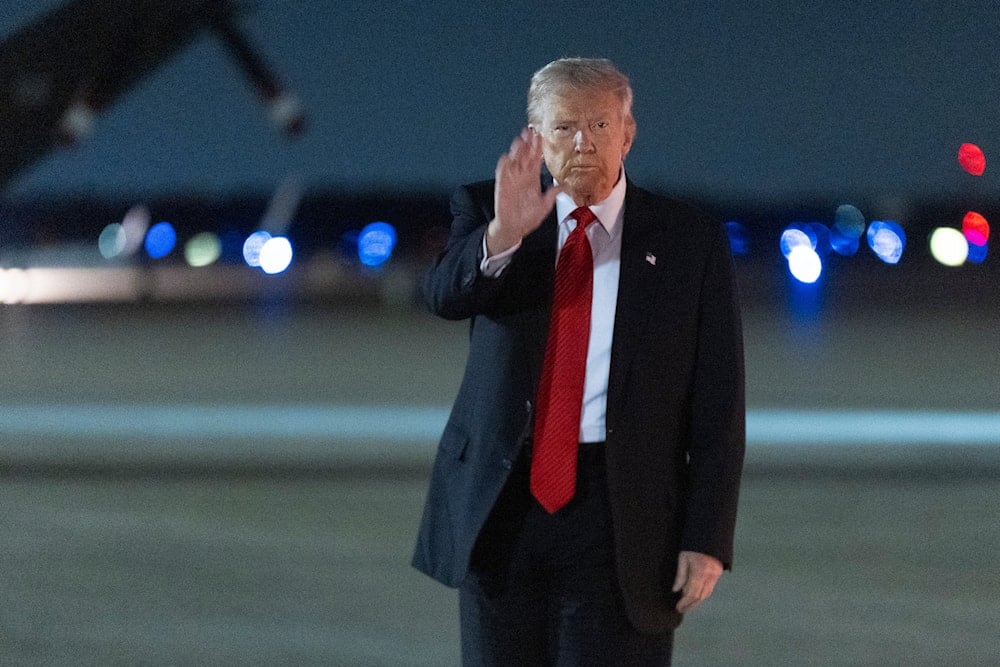Trump expands Venezuela briefings as ops spark Bipartisan alarm: Axios
Lawmakers demand answers on reported extrajudicial killings and naval activity linked to alleged US anti-narcotics missions near Venezuela’s coast.
-

President Donald Trump waves as he arrives at Joint Base Andrews, Md., on Air Force One, from a weekend trip to his Mar-a-Lago estate in Palm Beach, Fla., on November 2, 2025. (AP Photo/Manuel Balce Ceneta)
US President Donald Trump has instructed his staff to expand congressional briefings on his administration’s alleged anti-narcotics operations in the Caribbean and Pacific, following growing bipartisan unease over the scope and legality of US military maneuvers near Venezuela, Axios reports.
The move comes amid mounting concern over what lawmakers describe as “unprecedented” military activity off Venezuela’s coast and the reported extrajudicial killings of unarmed suspects, with at least 64 deaths linked to 15 boat sinkings. Members of both parties have called for greater transparency on how the White House is authorizing such actions.
In recent days, Trump has told aides to conduct additional briefings for members of Congress in response to a surge of complaints from lawmakers. “I keep getting calls about this from congressmen,” Trump told senior officials during a recent meeting, Axios reported, citing two people familiar with the discussions.
Secretary of State Marco Rubio has already led at least one session with the Gang of Eight, the top leaders from both chambers and parties, along with the chairs and vice-chairs of the Intelligence Committees, to explain the administration’s position, three sources told Axios.
That circle is now expected to expand, possibly doubling in size to include eight or more additional lawmakers. “We’re confident in the intelligence we have, and when it’s been presented by Rubio to the Gang of Eight, they support it,” one official said. “What Congress doesn’t support is not knowing about it.”
Rubio, accompanied by Pentagon legal advisors, is scheduled to brief lawmakers on Capitol Hill on Wednesday, a source confirmed.
Lawmakers divided after partisan briefings
The administration’s selective approach to intelligence sharing has already stirred tension on Capitol Hill. A Republican-only briefing held last week prompted outrage among Democrats. Senator Mark Warner (D-Va.), the top Democrat on the Intelligence Committee, blasted the move as "indefensible and dangerous."
Even some Republicans voiced discomfort, arguing that national security briefings of this nature must remain bipartisan. A subsequent joint session for the House Armed Services Committee did little to ease the frustration, with several Democrats reportedly dissatisfied with the administration’s legal rationale for its operations.
Since entering office, Trump has shown an unusually intense focus on Latin America, particularly the Nicolas Maduro government in Venezuela. Under his direction, the US deployed a large naval presence near Venezuela, part of what the White House framed as a "counter-narcotics mission", but one that also served to increase pressure on Maduro to step down.
Even before Trump’s inauguration, his transition team had called for "regime change" in Venezuela, Axios previously reported. Maduro, long accused by Washington of allegedly running a “narco state,” was indicted by the US in 2020, and earlier this year, Trump doubled the bounty for his capture to $50 million.
Internal debate over possible military action
Speculation has swirled that the administration may soon authorize strikes inside Venezuela, following reports that the Pentagon and intelligence agencies have been preparing for potential operations. But officials insist that no such decision has been made.
“It’s the president’s decision and the president’s decision only,” one senior official said. “And he has not made that decision.”
Officials also pushed back on rumors that the US might expand operations into Colombia, after Sen. Lindsey Graham (R-S.C.) suggested “military operations” could occur there. “There are no plans for strikes inside Colombia,” a source said.
Adding to the intrigue, NBC News reported this week that the Pentagon and CIA are intensifying training for possible strikes against alleged drug cartels inside Mexico.
While US officials did not deny the report, they emphasized that unilateral action remains unlikely without cooperation from Mexican President Claudia Sheinbaum Pardo. “Sheinbaum is an ally and the president [Trump] values her as such,” said a third official, stressing the White House’s preference for coordination over confrontation.
Read more: Donroe Doctrine: Trump’s neocolonial drive in Latin America

 4 Min Read
4 Min Read








